Ravi Veriah Jacques wakes up in his childhood bedroom and wonders if it will be a good day, which he defines as getting about two hours of activity – maybe playing the violin, or writing for a little while. The rest, he’ll spend in bed or doing what he calls “existing”: watching television with his eyes shut, trying not to think.
For over a year and a half, debilitating fatigue and a constellation of other symptoms have confined him to a quarter-mile radius around his father’s London home, circumscribing his former identity as a star Stanford University scholar and an accomplished musician whose life spanned the globe.
“To give up on the hope of getting better is to give up on life,” he said in an interview. But every month that passes without improvement makes it a bit harder to hope.
Ravi, who is 24, is one of tens of millions worldwide living with long Covid. The degree of suffering varies, but patients share one commonality: the fear of an uncertain future.
One question dominates Ravi’s thoughts: who will he be after his illness?
At the start of 2020, he was on top of the world. He had just won the Schwarzman scholarship, a prestigious grant to complete a master’s degree in global affairs at China’s premier university. He was also set to graduate from Stanford in the spring, where he had also founded a progressive campus magazine.
And then, a new virus surged across the globe.
Ravi finished his history thesis at home and graduated online. He moved forward with the Schwarzman program remotely and began taking classes on his computer from South Korea, where, in light of China’s strict quarantine, he and other program scholars had moved to.
He had dealt with episodes of extreme fatigue in college that were short-lived, usually following periods of high stress. One came in November 2020 and another in February 2021, when he spent half of the month in bed. A month later the fatigue came again, and this time, it never left.
He didn’t take a Covid test at the time, and a formal diagnosis would come later in the year, when doctors presumed he had contracted the virus asymptomatically and diagnosed him based on his symptoms and blood tests, which ruled out other conditions.
As an undergraduate, he was known as the student who did all the reading, and then some, and never shied away from taking on graduate students in debate with his characteristic flair, never pugilistic but rather disarming through enthusiasm and humor.
For a 20-page final assignment in a class his sophomore year, he turned in a paper 40 pages above the limit. It had kept Kathryn Olivarius, an assistant history professor, up until 3am, reading and editing the draft. Impressed, she went on to advise Ravi on his senior thesis. Ravi would have been a “brilliant academic, an absolutely brilliant historian”, she says.
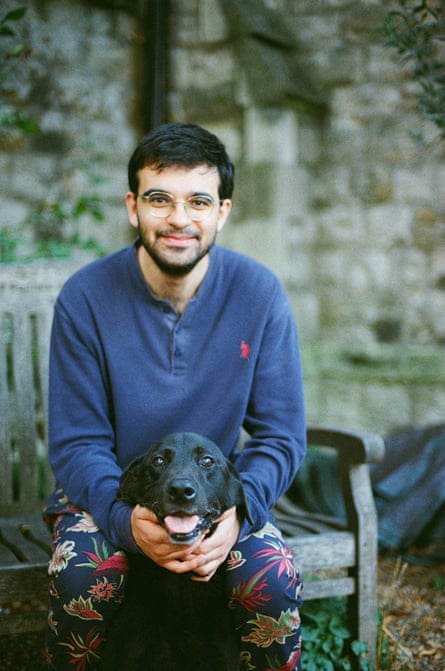
But 19 months of wrestling with his condition have worn away Ravi’s gusto. These days, Ravi is just as smart, but tired and living a bit more in his head.
Martin Jacques, Ravi’s father and the no-nonsense former editor of the London-based political magazine Marxism Today (he also has contributed for the Guardian on a regular basis), has suffered throughout life from serious episodes of chronic fatigue syndrome that could last months.
Long Covid shares traits with ME/CFS, as chronic fatigue is often abbreviated, a disease which can also be triggered by a viral infection. Martin worried Ravi might have inherited the same risk of fatigue, just as the two share the same color eyes and laugh. Ravi described his relationship with his father as out of “Finding Nemo” – difficult at times, but the bond is unbreakable.
“The worst-case scenario is that I get Cs,” Ravi told his father.
“The worst-case scenario is that you’re ill for a year,” Martin responded.
The worst-case scenarios soon became Ravi’s reality. At first he aimed for extensions on assignments to get through his classes. When those were not enough, he made plans to postpone his thesis. After weeks of exhaustion, he formally requested a leave of absence, assuming that stopping work entirely would lead him to improve. He spent upward of 16 hours a day in bed. Even reading novels or listening to music felt like too much. He said he often felt like “a sick animal, going off to hide in a corner”.
He did not improve, and to his shock, he realized he had also lost his sense of smell and taste, which were easy to lose track of in the face of exhaustion. There had been tasteless meals, but he had written them off to him being a bad cook.
Martin saw Ravi’s illness through the prism of his own – perhaps Covid had triggered a chronic disease that Ravi was predisposed to – which had its benefits. Chronic illnesses have the stigma of being psychosomatic, but Martin knew from his own episodes of fatigue that what Ravi was going through wasn’t in his head.
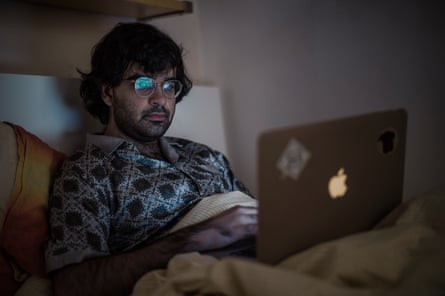
It is not known whether having a parent with a chronic illness leaves one more susceptible to long Covid. “It’s a blind spot at this point,” said Ziyad Al-Aly, who studies long Covid at the Veterans Affairs St Louis Health Care System in Missouri. Anecdotally, he added, he had seen long Covid patients who have family members with chronic fatigue, but research into the question was needed.
In these moments, Ravi acutely missed his mother, who had died when he was a baby. Harinder, Hari for short, was the type of person both father and son agree you’d want by your side when ill.
Martin met Hari while on holiday in Malaysia, and it was love at first sight, despite the differences between the two: white and brown, atheist and Hindu, 47 and 26. The two married, and Hari’s job as a lawyer brought the family to Hong Kong, where Ravi was born.
The fairytale romance ended in extraordinary tragedy. At the turn of the 21st century, when Ravi was just a year old, Hari, who had epilepsy, suffered a grand mal seizure. “I am at the bottom of the pile here,” she told Martin in the hospital, referring to the racism she faced from the doctors and staff for the color of her skin. Martin raced to get Hari discharged, but an hour before he was set to take Ravi to the hospital and bring her home, she died of another seizure.
Martin raised Ravi alone while taking legal action against the hospital, arguing that Hari’s death had been the product of negligence, a case that was settled 10 years later. Martin tried to be both a father and mother to Ravi, but the more loving and caring side to him that came so naturally when Ravi was an infant became difficult to express when the child grew into a teenager.
Ravi recalled a father who pushed him to succeed academically and with the violin. His mother, he was told, would say: “I don’t care who Ravi is, so long as he’s kind.” Ravi knew Hari only through stories, and she was remembered as almost impossibly perfect, complicating his relationship with his very real, very present father.
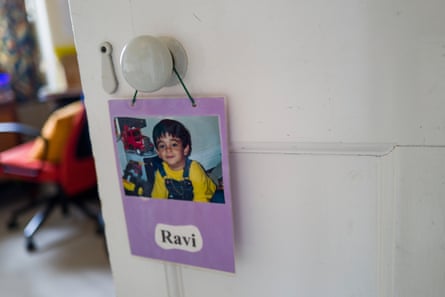
As his illness dragged on, Ravi set up a summer appointment with a general practitioner through the publicly funded National Health Service in England.
The process for getting an appointment was slow and not helped by Ravi’s reluctance to go – he was still sure he would get better any day now. The doctor suspected long Covid and referred him to the University College London Hospitals’ (UCLH) post-Covid clinic, where he secured an appointment for December 2021.
For Martin’s birthday in October 2021, Ravi thought about what would be the best gift he could give, as his father’s life had also become dominated by Ravi’s illness. Ravi decided to pick up the violin again, as he thought his playing abilities were one of the things Martin was most proud of about him.
At 11, he had named his dog Brahms, after the composer. And the older he got, the more time his teachers expected him to dedicate to his craft. He woke up at 6am to practice for an hour before attending the Westminster school, a prestigious private school in London, and squeezed in a second session at 10pm after his homework was done. He couldn’t keep up with the other students who could put in double that time, and he found himself souring on the instrument during those years.
Ravi prepared for the birthday by playing for 30 minutes a day for three days, the most he felt physically capable of doing. On the night of the birthday, he popped out from a side room with his violin, surprising Martin and longtime family friends. He tried to put technique to the side and focus on bringing out the slow, transcendent moments of Brahms’ Violin Sonata No 3.
The music shocked Martin, who was beyond pleased. Ravi may have been rusty, but it didn’t matter how he played, though “the more he played, the better he got”, Martin said.
After the birthday, Ravi experienced a gradual increase in his health, a promising sign in advance of his December visit to the UCLH clinic. At the appointment, on a one-to-100-point scale from worst to best health, Ravi ranked himself an 18. A physiotherapist gave him advice on pacing, an activity management technique to manage his symptoms, and doctors ran a battery of tests on him to rule out other conditions. All came back clear – long Covid is a diagnosis of exclusion.
A doctor told Ravi that, hopefully, he would continue to improve in the months to come. It was nice to hear then, frustrating to think about now.
Since the diagnosis, Ravi’s physical health has plateaued, despite moderate improvement at the end of the year. He’s still learning to live with the condition and manage the psychological consequences of losing his former life.
He wonders if his fast-paced life contributed to him getting long Covid, but he’s come to believe it was mostly a matter of biology. Others, he said, pushed themselves harder and didn’t get this ill. But the experience of having prolonged illness has led him to reflect on how he lived before and want to live a very different life once his illness is over.
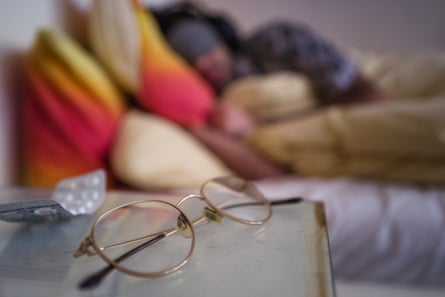
He’s been helped by finding community with others suffering from long Covid. He joined Twitter in November 2021, and his identity as a young person with long Covid drew some media attention. In January, he presented to a cross-party group of members of the UK’s parliament focusing on coronavirus about his experience. It felt good to take part in advocacy, Ravi said, a movement he’s certain will be on the right side of history.
“I’ve been so lost with the illness,” he said. “I had all these different parts of my life that were taken away. Then, I found a voice and a community with the long Covid activism, something to keep me going and make my days matter.”
Ravi and his father still clash on occasion, as all families do, but they’ve also grown closer. Ravi appreciates that Martin will sometimes take him out to lunch on the days where he’s feeling a bit better and has started to hug him out of the blue.
Martin recalled Ravi saying: “Daddy, sometimes you’re too hard on me.” He sat with that thought, and he’s trying to improve.
Despite the increased support, Ravi still feels that the illness is his to face alone. He’s turned to the Virginia Woolf essay On Being Ill for how it captures the isolation of prolonged sickness. Woolf writes that those who are well “march to battle” every day. The sick “cease to be soldiers in the army of the upright; we become deserters”.
Ravi wonders who he’ll be when this is over, when he joins the world of the marchers again. He longs to have the energy to read again for long stretches, but he’s no longer sure he wants to commit to a life in academia. For the first time, he questions why, say, a PhD in history would matter. The world right now, he thinks, needs scientists and advocates more than it needs an intellectual.
In April 2022, Ravi went to a clinic in Rugby, Warwickshire, to try an experimental treatment. He rented an Airbnb for a month and participated in hyperbaric oxygen therapy, where he sat in a high-pressure chamber and breathed in pure oxygen.
He felt cautiously optimistic, as he said the clinic suggested patients could experience a 70% to 90% improvement in their symptoms, though the results had not been studied at a larger scale. But the juxtaposition of the numbers put forth by the clinic and his experience lent itself to large mood swings between hope and despair.
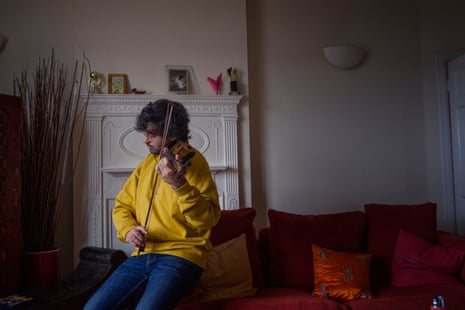
Sitting at the base of the stairs of the Airbnb, his shirt blending in with the blue of the wall, Ravi rejected the possibility that he would not get better.
“Many people in history have been ill for two, three, five years,” he said, his voice rising. “Virginia Woolf was continuously ill for years and years. Beethoven was ill. I’m not saying I’m going to be like them, but people in the past have had the same experience as me, and they’ve been fine. I might lose my 20s. So what? People fritter away their 20s. I’ll still have my 30s and my 40s, and my 50s and 60s, and my 70s and my 80s, if I’m lucky.”
His health instead worsened after the clinic, and he further deteriorated over the summer. He felt as though he had lost control of his body and was falling into the darkness, unable to find his footing and with no end in sight. Today, he spends 17 or more hours a day resting, and his life has become further limited. He still insists he will get better.
While he may not know who he will be after his illness, he knows what he’ll play: Beethoven’s Violin Sonata No 10.
It’s a warm and intimate piece of music, not as technically demanding as Beethoven’s other works, but it requires a precision to play.
When he listens to it, Ravi hears what he’s lost in the calm of the sonata and the melodies that never rise above a mezzo forte.